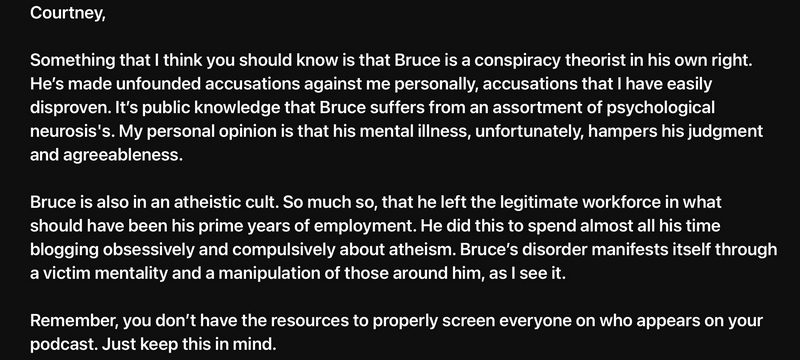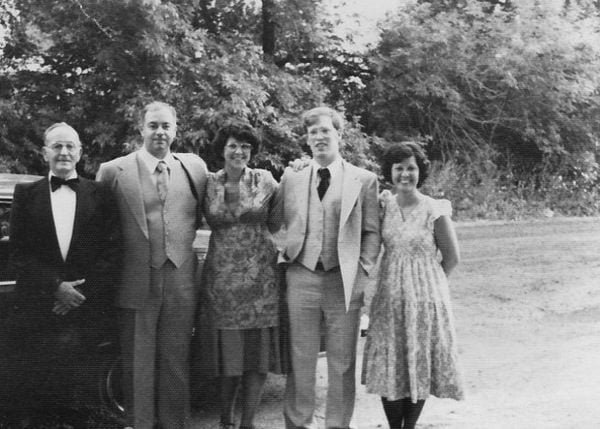
Somewhere on this site, I wrote:
The reasons for my deconversion are many. Poor pay, psychological stress, and chronic illness and pain, all played a part in my loss of faith, as did my inability to square the indifference of God to the suffering of humans and animals alike. Ultimately, though, I left Christianity because I no longer believed the central claims of Christianity to be true.
Calvinist troll Victor Justice stumbled upon this post and decided to use it to deconstruct my life. What follows is my response. All spelling and grammar are in the original.
So let’s unpack some of this:
POOR PAY:
….
Paying fellow Christians fairly and graciously for the work that they do should be part of the love we should have for the brethren. I can see how being mistreated in this way could build great resentment. I’d also think that mature, GOD fearing men would be able to distinguish between the atrocious acts of some men, many who are fake Christians, and GOD’s real plan clearly proclaimed and commanded by His holy Word.
Justice will search in vain for a post where I say I resented the churches I pastored for any reason, let alone the income they paid me. Every church I pastored (all of which were new church plants or young churches), except two, paid me what they could. The other two could have paid me more but chose not to do so. That’s why I worked secular jobs. I was always a full-time pastor, regardless of what I was paid.
I do appreciate the fact that Justice admits he is a fake Christian. His “atrocious acts” on this site make it clear that he is not a real Christian.
You strike me as someone who wouldn’t pay those who labor in the ministry much better, unless you were personally affected. That’s the honest sense I get from reading you extensively for many years. You sound like the quintessential cheapskate from what I’ve been able to glean. OCPD is highly correlated with extreme selfishness, but the sufferer still has a choice.
Nothing I have written would lead a fair-minded reader to conclude I was a “quintessential cheapskate.” Justice is just making shit up. He continues to say that he has read my writing extensively for years when, in fact, he has not.
By all means, ask Polly, my children, grandchildren, friends, colleagues in the ministry, and former church members if I am selfish. These people will give testimony to the fact that I am a generous person, someone who has gladly suffered loss for the sake of others. Over the years, I loaned church members money (which often went unpaid), bought them groceries, paid their rent and utilities, purchased them automobiles and appliances, clothed their children, and did what I could, with my own money, to model Jesus to them. Maybe I will share some of these stories in the future.
Justice, of course, has zero evidence for his claims.
PSYCHOLOGICAL STRESS:
I speak from experience as someone with OCD (not OCPD). Living with this type of disorder would predispose you to elevated levels of stress no matter what your chosen profession. Add to your OCPD, narcissistic tendencies, obesity, and indifference and you have a recipe for disaster that is now very much your reality. But, we both know that the real elephant in the room is trying to do this IN THE FLESH, as you are not saved, and you never were saved. End of story here.
No matter what I say or try to explain, Justice will continue to say things like this. Yes, I was diagnosed with OCPD. Yes, I am obese, though I weigh 110# less than I did two years ago. Everything else Justice says is untrue, and he knows it.
CHRONIC ILLNESS/PAIN:
Again I speak with much experience. You’re a miserable person to smear others living with severe pain, illness, disease—with the fruits of a rotten to the core, heretical, bastard like yourself! This amounts to nothing but self pity.
I have no idea what Justice is talking about. Where have I ever smeared someone else living with chronic illness and pain? Justice will, again, search in vain for evidence to bolster his claims.
TENETS OF CHRISTIANITY:
You started dabbling with leftist political thought, which is some of the most effective work of the Devil. What happened in the process of your lust for the things of the world, the flesh, and the Devil is that you got Completely Sucked IN!
Your story really isn’t really so unique or fascinating, as it is common, pathetic, and sad. It has not only cost you everything, but it’s also cost YOUR FAMILY everything…you fat, lazy, miserable slob! Your family—your children—that the LORD Jesus Christ blessed you with, are now all messed up! And they will continue to be messed up because of the sins that you have committed!
GOD Almighty blessed you in all of His graciousness and deep goodness. You have no one to blame, but yourself. Not Polly, not Polly’s family, not your parents, not your grandparents, not any trolls or haters online! Just little, sad, Bruce. You dig?
These paragraphs will be the last ones Justice will ever write on this site. The same goes for Revival Fires — Justice’s lover. Both of them are using VPNs to evade blocking technology. While I know what VPN service they are using, I can not block it due to the fact that other readers, including several regular commenters, are using this particular VPN service. I will no longer acknowledge their emails/comments, deleting them immediately. I have also deleted ALL of their previous comments. Both of these vile men only care about inflicting me with psychological harm. I plan to rob them of the power to do so.
After this post was published, Justice left the following comment on YouTube:

Bruce Gerencser, 68, lives in rural Northwest Ohio with his wife of 47 years. He and his wife have six grown children and sixteen grandchildren. Bruce pastored Evangelical churches for twenty-five years in Ohio, Texas, and Michigan. Bruce left the ministry in 2005, and in 2008 he left Christianity. Bruce is now a humanist and an atheist.
Your comments are welcome and appreciated. All first-time comments are moderated. Please read the commenting rules before commenting.
You can email Bruce via the Contact Form.









